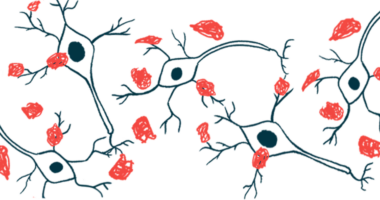
Opening up to your doctor about Parkinson’s psychosis
Last updated Sept. 16, 2024, by Mary Chapman

Parkinson’s disease is perhaps best known for motor symptoms such as tremor and rigidity. But more than half of people with the neurodegenerative disorder will ultimately experience psychosis, which is one of the nonmotor Parkinson’s symptoms.
Your psychosis symptoms, such as hallucinations and delusions, can be alarming to you and your caregiver. And even if you feel you can handle them at first, they can eventually affect your quality of life and relationships with family and friends.
Having the courage to discuss symptoms with your healthcare team is key to getting a confirmed diagnosis and cause, and start treating your psychosis.
What is psychosis?
Hallucinations and delusions from Parkinson’s psychosis can be due to brain changes, medication side effects, or delirium — a state of sudden confusion that affects focus and awareness.
Hallucinations are when you see, hear, or feel things that don’t exist. Perhaps you notice people or animals, or smell odors that aren’t actually there. Or imagine hearing music or voices, or feeling something is on or under your skin.
Delusions are when you believe something that seems true to you but is irrational or illogical. They may include, for example, fear of being poisoned by food or medication, or being suspicious of a trusted person, such as your spouse, child, or other caregiver. You may believe that a spouse or partner is being unfaithful, or that a family member or pet has been replaced by an identical imposter.
Psychosis also can cause behavioral issues. You may start to be mean to loved ones or often feel angry. Hallucinations and delusions can cause you to become frightened, anxious, or agitated.
When not treated, severe psychosis can interfere with sleep, raise stress levels, and create fall risks or other safety concerns. It can increase hospitalization risk, care costs, and the necessity for long-term care. It can also potentially worsen when you are sick or in the hospital or other unfamiliar environments.
“There are a lot of aspects to Parkinson’s that are missed as folks tend to focus on tremor, shuffling, and the obvious motor symptoms,” says Michael S. Okun, MD, medical adviser for the Parkinson’s Foundation. “It turns out that depression, anxiety, and psychosis have a more dramatic effect on quality of life. These may be invisible unless we scratch the surface to search for them.”
According to the Parkinson’s Foundation, up to 90% of people do not talk to their doctor about their psychosis symptoms.
“Embarrassment is a common hurdle to the identification and treatment of psychosis,” Okun says . “We must work harder to destigmatize this symptom and to help folks to lead impactful lives without one more thing to worry about.”
The importance of prompt diagnosis and treatment
It’s normal when experiencing hallucinations or delusions to feel self-conscious, embarrassed, or even frightened about sharing symptoms with your doctor, neurologist, or healthcare specialist.
Sometimes, you may even know that what you are experiencing is not real, which is called retaining insight.
But symptoms should never be ignored, even if they’re not bothersome, as diagnosis is key to putting together a psychosis treatment plan.
“Psychosis is tricky as a symptom to manage since in some cases it may be relatively benign with retained insight and in others it can be severe and can rapidly worsen,” says Okun, who is also the director of the Norman Fixel Institute for Neurological Diseases at the University of Florida in Gainesville. “We need to do a better job teaching persons with disease, and also caregivers to act immediately if there are changes in mood or emergence of hallucinations.”
Talking to your medical team
“It’s usually the caregiver who mentions symptoms to the doctor — not the person experiencing them,” says Rebecca Gilbert, MD, PhD, chief mission officer of the American Parkinson Disease Association. Though in her experience, it’s often the doctor who uncovers symptoms during regular office visits.
“We’ll ask about motor symptoms … to keep track of medication doses and all that,” says Gilbert, who adds that while the risk of psychosis increases with age, younger people with Parkinson’s also can develop the condition. “We’ll ask about constipation and sleep and mood. And hallucination. That’s where that can come out.”
In the vast majority of cases, Gilbert says, psychosis is due to a Parkinson’s medication that needs a dosage adjustment: “People need to be aware that they’re not crazy … that the medication is driving it.” She points out it also can be caused by a non-Parkinson’s medicine.
That is why a dialogue between you, your care partner, and your doctor is critical to effectively managing the condition.
When discussing symptoms with your doctor, be as thorough as possible, Gilbert says. For example, you want to include any details about the episode you can remember, such as where and when it occurred, and how tired or hungry you were.
Gilbert says that people who are having Parkinson’s psychosis symptoms don’t usually go “from zero to 60” right away in terms of severity, which is why she encourages you to get help when symptoms first appear.
“Just say what’s going on so the doctor can assess,” she says.
In addition to adjusting medication dosages, possible solutions can include Parkinson’s psychosis medications as well as “off-label” medicines — those not specifically developed for Parkinson’s psychosis.
The American Parkinson Disease Association offers suggestions for talking to your doctor about mental health issues like Parkinson’s psychosis.
- Don’t assume that it can’t be treated. Even if the issue isn’t solved, it may be helped by a medication adjustment, new treatment, or lifestyle change.
- Be proactive about speaking to your doctor about symptoms. Your doctor may not bring up cognitive issues at every visit, so you need to bring them up yourself.
- Specifically discuss how the symptoms are affecting you and your loved one.
- Before every visit, make note of what has improved or worsened the condition, particularly in terms of sleep, diet, or medication timing.
Parkinson’s News Today is strictly a news and information website about the disease. It does not provide medical advice, diagnosis, or treatment. This content is not intended to be a substitute for professional medical advice, diagnosis, or treatment. Always seek the advice of your physician or another qualified health provider with any questions you may have regarding a medical condition. Never disregard professional medical advice or delay in seeking it because of something you have read on this website.
Recent Posts
- New trial data show early biological signals for Parkinson’s therapy
- Taking time for self-care is crucial as a caregiver
- Early trial data suggest GT-02287 may ease Parkinson’s symptoms
- The new year is a perfect time to reflect on unexpected gifts
- Webcams, AI track Parkinson’s progression using eye movement




